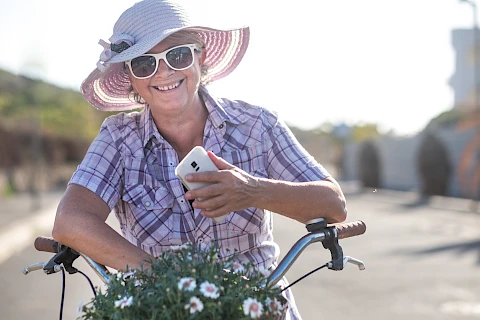
July is UV Safety Month. It is a time to learn about the importance of protecting ourselves from the sun's harmful ultraviolet (UV) rays. As we grow older, our skin becomes thinner and more susceptible to damage, making UV protection especially critical for seniors. Let’s explore the best practices for protecting your skin and eyes from UV rays and learn why regular check-ups are essential for maintaining good health.
What Are UV Rays?
Sunlight contains two types of UV rays: UV-A and UV-B. Both of these can damage your skin and eyes. UV-A rays can cause premature aging and wrinkles, while UV-B rays are more likely to cause sunburn. Overexposure to either one can lead to skin cancer and eye conditions like cataracts. Seniors’ skin is more fragile and their eyes may already have conditions that can worsen with too much sun exposure. It makes sense to take extra precautions.
Best Practices for Sun Protection
Seniors can protect themselves from the harmful effects of the sun's rays in various simple ways. Here are a few:
Wear Protective Clothing
Choose clothing that covers as much skin as possible. Lightweight, long-sleeved shirts and long pants with tightly woven fabrics offer better protection. A wide-brimmed hat can shield your face, neck, and ears which are common areas for skin cancer.
Use Sunscreen
Sunscreen is a must when spending time outdoors. Select a broad-spectrum sunscreen with an SPF of at least 30. Apply it generously 15 minutes before you go outside and reapply every two hours or more often if you are sweating or swimming.
Seek Shade
Avoid being outside during peak sun hours, which are usually between 10 am and 4 pm. If you need to be outside, seek shade under trees, umbrellas, or other structures. Taking breaks in the shade gives your skin a chance to recover and reduces overall UV exposure.
Protecting Your Eyes
Just as your skin needs protection from the sun, so do your eyes. Here’s what you can do:
Wear UV-Blocking Sunglasses
You need sunglasses that block 100% of UV-A and UV-B rays. Look for glasses that have a UV protection label. These sunglasses can help prevent cataracts and other sun-related eye conditions.
Choose the Right Sunglasses
Choose wraparound styles to protect your eyes from all angles. Sunglasses that fit close to your face and have wide lenses offer the most protection. Polarized lenses can reduce glare and make it easier to see in bright conditions.
Wear Hats With Brims
A hat with a brim can provide additional protection for your eyes. When combined with sunglasses, a hat can significantly reduce UV exposure. Your best defense is a combination of these sun-protective measures.
Why You Should Get Regular Check-Ups
Regular skin examinations can help detect skin cancer early. Perform self-checks for new or unusual moles or spots. Look for changes in color, size, or shape. See a dermatologist for a professional skin exam at least once a year. Keep your eyes healthy with annual visits to the optometrist. Eye exams can catch early signs of cataracts and other UV-related conditions. Make sure to discuss any changes in your vision with your eye doctor.
Senior Helpers Can Help With Sun Safety
Senior Helpers offers a wide range of comprehensive, in-home senior care services. If you live in the New Hanover, Pender, Brunswick, or Wilmington areas, contact us today at Senior Helpers Wilmington. Our team can help you stay safe and healthy, whether you need sun protection advice or any other senior care service.